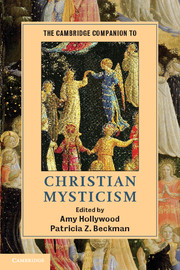Book contents
- Frontmatter
- Contents
- Contributors
- Introduction
- Part I Contexts
- Part II Key Terms
- Part III Contemporary Questions
- 13 Latin and the Vernaculars
- 14 Transmission
- 15 Writing
- 16 The Body and Its Senses
- 17 Mysticism and Visuality
- 18 Emotion
- 19 Authority
- 20 Gender
- 21 Sexuality
- 22 Time and Memory
- Select Bibliography of Christian Mystical Texts up to around 1750
- Select Bibliography of Modern Works Related to the Study of Western Christian Mysticism
- Author and Artist Index
- General Index
- References
15 - Writing
from Part III - Contemporary Questions
Published online by Cambridge University Press: 05 December 2012
- Frontmatter
- Contents
- Contributors
- Introduction
- Part I Contexts
- Part II Key Terms
- Part III Contemporary Questions
- 13 Latin and the Vernaculars
- 14 Transmission
- 15 Writing
- 16 The Body and Its Senses
- 17 Mysticism and Visuality
- 18 Emotion
- 19 Authority
- 20 Gender
- 21 Sexuality
- 22 Time and Memory
- Select Bibliography of Christian Mystical Texts up to around 1750
- Select Bibliography of Modern Works Related to the Study of Western Christian Mysticism
- Author and Artist Index
- General Index
- References
Summary
In Evelyn Underhill’s popular study, Mysticism (1911), she defines mysticism as “experience in its most intense form.” A mystic writes, Underhill argues, because she is “often a literary artist as well” and is able to clothe her intense experience in symbolic language so as “to stir our own deeper selves in their sleep.” On this understanding, mystical scriptio is the experiential report mystics give us to read, with the hope that our practice of reading will awaken the desire and perhaps even the capacity to enjoy such experiences as they do. Scriptio serves lectio, which in turn serves experientia. No doubt this is in part true. Mystics have left reports – often opaque and indirect – of their own visions of and encounters with the divine. Yet this account has at least two flaws. First, to define mysticism as the reception of a certain kind of intense experience is questionable, as if mysticism were simply the accumulation of discrete, extraordinary “experiences” to be delimited and then described, however poorly. Second, it is not fair to the historical record to suggest that mystical writing is only a kind of vehicle (form) for the transfer of a certain experiential cargo (content).
I wish instead to suggest that mystical writing can serve as a spiritual exercise in the service of soliciting an encounter with the mystery of God. Bernard McGinn insists that we “remember that mysticism is always a process or a way of life” and that “everything that leads up to and prepares for this encounter [between God and the human] … is also mystical.” Underhill’s account of writing would place it always in the wake of the mystical encounter, whereas McGinn suggests that writing constitutes part of the devotional life of the mystic and thereby prepares for and invites that event. His brief description of mysticism as a “way of life” recalls Pierre Hadot’s styling of ancient philosophy as a way of life, a program of “spiritual exercises” whose aim is to remake the philosopher in conformity with ultimate reality. Hadot highlights writing as one of the principal spiritual exercises of ancient philosophy.
- Type
- Chapter
- Information
- The Cambridge Companion to Christian Mysticism , pp. 252 - 263Publisher: Cambridge University PressPrint publication year: 2012
References
- 1
- Cited by

